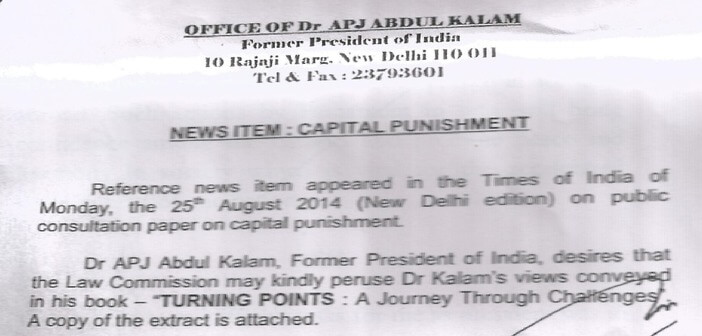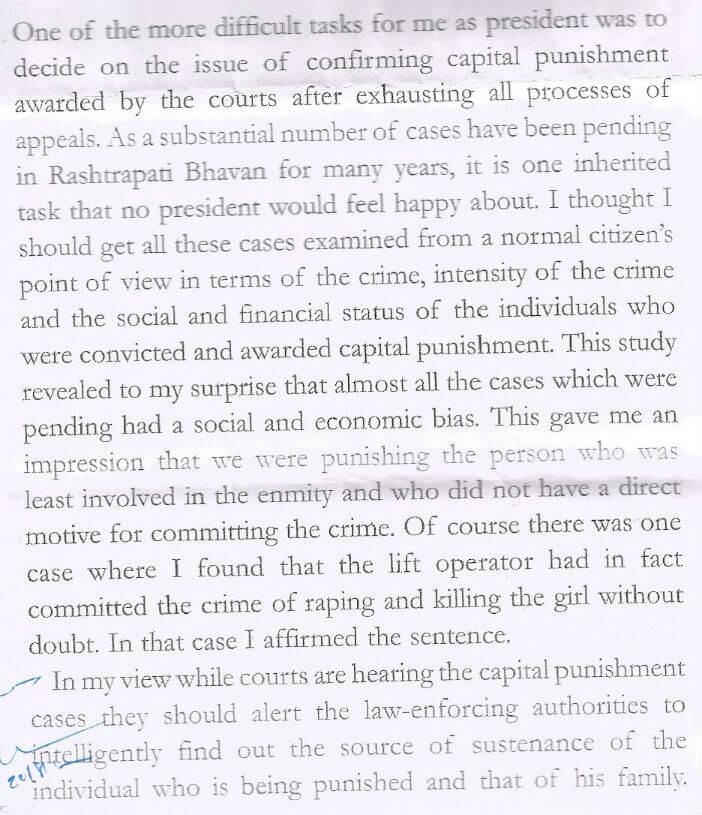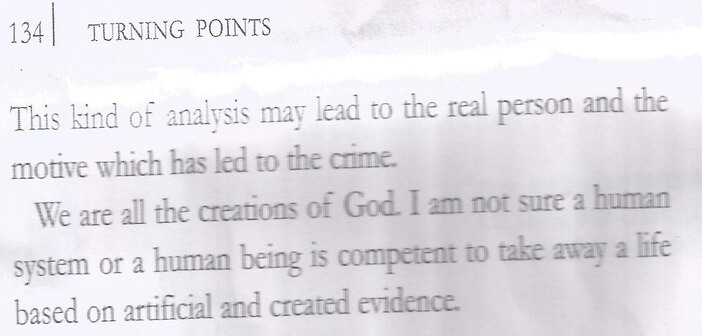[orc]The hanging of the 1993 Mumbai blasts accused Yakub Memon & the untimely death of the Former President Dr. A P J Abdul Kalam, both happened around the same time. Dr. Kalam’s views on death penalty, as expressed in his letter to the Law Commission, in response to the Commission’s consultation paper on Capital Punishment were widely discussed during this time.
The hanging of the 1993 Mumbai blasts accused Yakub Memon & the untimely death of the Former President Dr. A P J Abdul Kalam, both happened around the same time. These incidents led to a discussion around not only death penalty but also on how different Presidents dealt with mercy petitions during their term in office. Of more interest were Dr. Kalam’s views on the death penalty, since he disposed only two mercy petitions during his term in office. Factly obtained a copy of the letter written by Dr. Kalam to the Law Commission of India, in response to the Commission’s consultation paper on Capital Punishment.
Law Commission’s Consultation Paper
The Law Commission of India, in May 2014 has put out a consultation paper on Capital Punishment and asked for suggestions from people. In the consultation paper, the commission asked various questions including the following,
- Are you in favour of retaining capital punishment on the statute book?
- If you are in favour of retention of capital punishment, please indicate your reasons for the same –
- Capital Punishment acts as a deterrent for future crimes
- Retribution through death penalty is the most effective means of achieving justice for the victim and provide closure to the victim/victim’s family and society
- Capital Punishment ensures that the convicts are never released back into society as they may pose a threat in future
- Capital punishment reduces the chances of convicts escaping from prison
- Those accused of capital crimes do not deserve an opportunity for reformation
- The severity of a crime should mandate an equally severe punishment
- Capital Punishment ensures jails are not overpopulated/overcrowded as the current prison infrastructure is inadequate to accommodate too many prisoners for life
- Capital Punishment may impose less financial burden on the State as the cost of imprisoning someone for life may be higher
- Any other reason.
- Which of the above arguments in support of death penalty is the strongest?
- Deterrence
- Justice
- Satisfaction of effective punishment being delivered for victim/victim’s families
- Cost
- If you are in favour of abolition of capital punishment, please indicate your reasons for the same –
- There is no conclusive proof that capital punishment acts as a deterrent for future crimes
- Capital punishment imposes hardship and trauma for the convict’s family who may have had no role in the crime
- Capital punishment confuses the idea of retribution with justice and society must move away from the conception of “an eye for an eye”
- Capital Punishment deprives people of the opportunity to reform
- Most countries have abolished capital punishment
- The imposition of capital punishment is not free from risk as there is a chance of innocent people being sentenced to death
- The application of capital punishment is too judge centric and depends on a judge’s personal belief against or in favour of death sentence
- Economically and socially backward groups will always have greater chance of being subjected to capital punishment than the rich
- Capital Punishment is a form of state sponsored violence
- The mode of execution i.e. hanging by the neck until death is cruel
- Any other reason .
Dr. Kalam’s submission to the Law Commission
In response to the public notice, Dr. Kalam forwarded his views on death penalty to the Law Commission. He sent excerpts from his book ‘Turning Points: A Journey Through Challenges’ to be considered his views on the subject.
He went on to quote from his book and said that confirming the capital punishment awarded by the courts was one of the more difficult tasks as a President. He also said that a substantial number of mercy petitions were pending for many years and it is one task no President would be happy about. The letter quotes from the book as Dr. Kalam saying, “I thought I should get all these cases examined from a normal citizen’s point of view in terms of the crime, intensity of the crime, and the social and financial status of the individuals who were convicted and awarded capital punishment.” He said that almost all the pending cases had a social and economic bias.
He went on to say that the study of all pending petitions gave him an impression that we were punishing the person who was least involved in the enmity and who did not have direct motive for committing the crime. He also said that there was one case in which he confirmed the death sentence because he found the lift operator had in fact committed the crime of raping and killing a girl without doubt.
He also said that courts, while hearing the capital punishment cases should alert the law enforcing authorities to intelligently find out the source of sustenance of the individual who is being punished and that of his family. He said that this kind of analysis might lead to finding out the real person and motive that led to the crime.
As concluding remarks, he said that we are all creations of God and that he was not sure a human system or a human being is competent to take away a life based on artificial and created evidence.





